For Men’s Mental Health Month 2025, David Radcliffe has shared his experience of caring for his son George and how he got through each day. George was diagnosed with a rare and aggressive cancer at the age of three. He passed away in October 2023.
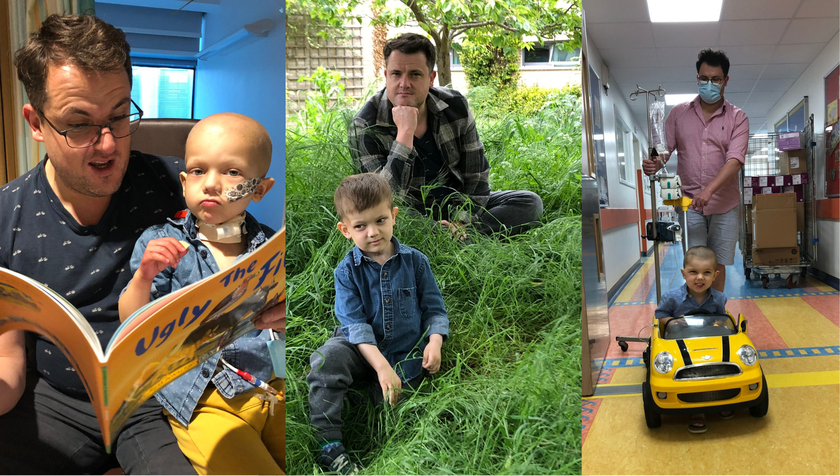
All George wanted was to be the wonderful boy that he was. He didn't ask for the cancer, but he had it. The boy that he was at that point was an amazing little boy with cancer.
I think the trauma of having a son going through that treatment, and the trauma of experiencing it myself, can sometimes be tricky to reflect and look back. Things still hit me when I'm least expecting it - the day George was diagnosed; the day we first saw the lump; or the day he started treatment.
One of the things I found most difficult was wanting George to still be a little boy. Even now I struggle with the concept of George, the boy that had cancer, George, the boy that didn't have cancer. Of course, George was all those things and more.
At the time, going from appointment to appointment, from surgery to surgery, going to live in London when George was having proton beam therapy, learning how to change those trachey tapes … the list goes on. The bombardment of trying to keep your head above water while also trying to be a good dad is, was, really difficult. Watch David's video (opens in a new tab)
Diagnosis and understanding
I remember the day where George had his first treatment and suddenly had wires coming out of his chest. He didn't really understand it. I think, certainly, what helped was we always spoke to George. He never felt scared. Maybe he did very briefly, but as long as his mum and I stayed positive and explained what was happening, he understood. We were very lucky that George was an incredibly articulate little boy.
Fortunately, he never knew his life was coming to an end, but he understood that there were naughty cells. The doctors and nurses were there to help him and give him special medicine to fight those naughty cells that didn't really understand their job anymore.
The most important thing was the doctors and nurses genuinely listened to me and Lisa when we said George will understand more than you realise. They were careful not to have some of the scarier conversations in front of him.
Thinking about the boy George would be, if he'd survived some of those treatments, is something tricky to reconcile. A healthy, happy little boy, becoming very ill and passing - that entire journey was very, very difficult.
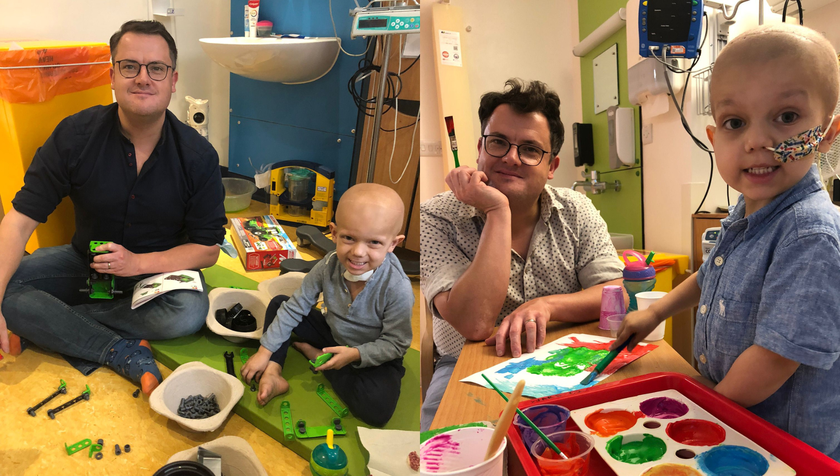
Being in hospital
In the hospital, George’s mum and I split the jobs. We fell into roles which were more traditional. My wife, when we first got together, was the breadwinner, but when George became ill, she very much became his main carer. There wasn't really a day that Lisa wasn't in the hospital. The priority was always George in all those moments.
Looking back, I wish there were meals given to parents, that it wasn't always a case of having to try and batch cook at home and bring stuff in and try and find a way of heating it up.
From day one, the health professionals helped us understand what the implications were of this disease and what the treatment options were. I’m sitting here wishing the results had been different, but the staff at Addenbrooke’s and then University College London Hospital (UCLH) and Great Ormond Street were incredible, even though their workloads are insane.
Finding ways to cope
I set up a WhatsApp group and just called it ‘Stuff’. I put my five closest mates in there. They didn’t necessarily know each other brilliantly but I consider them all very close friends. I just kept saying stuff in there about how I was feeling. That first day, I said “I've cried 28 times!”, not to make a joke of it, but just to show the reality of it.
I heavily got into cooking. I almost wanted to create this perfect nest at home where, you know what, George is going to have this awful treatment, but at least I know that mum and son are fed. That helped me. I guess it comes back to purpose.
When you're firefighting in those early days, just learning about diagnosis and treatment, you're always going to be wanting to try and do what you can to keep that family unit safe. George was a little boy still wanting to be a little boy, still wanting to find joy and go outside and, and get in nature.
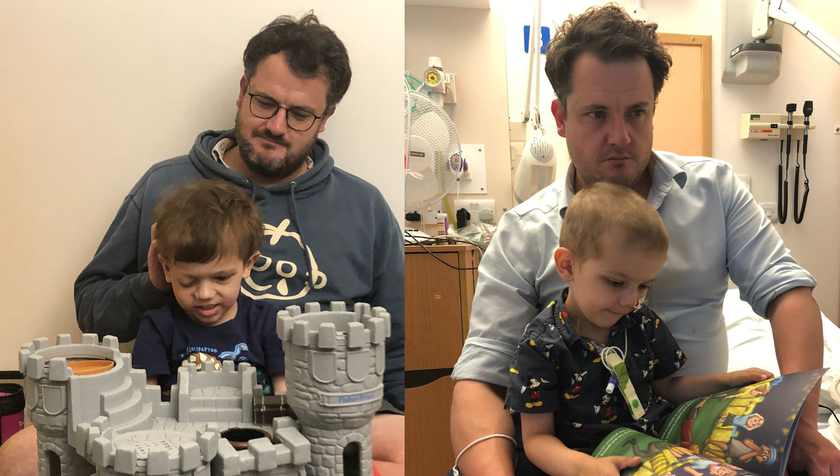
I remember being in a really dark place. I was stuck in Camden in this beautiful flat that UCLH got for us. But I was on my own. Lisa and George were at the hospital. They very much needed to stay there. Every morning, I would walk two miles to UCLH. Then I would walk two miles back to the apartment and get on with work and then walk back to the hospital and then go on our London adventures, going on a red bus or going to a cool museum.
I suddenly realised how much it was helping me. Just that little bit of fresh air. Get outside, get some fresh air, let the sun hit your face.
There were other coping mechanisms which I leant into, pouring too many glasses of wine every evening. Looking back now, I can't regret it. I did the best I could, but if I hadn't drunk that wine in the evening, maybe I'd have been a better dad to George in that moment.
Moments of self care
The charity Young Lives versus Cancer said that one thing to do today is set yourself a target and then reward yourself for doing it. This is going to sound mad, but I was in the flat, on my own, laying on the sofa and I couldn't be bothered to move. I got up, I walked across the room, and I took a vitamin tablet.
It was the tiniest bit of self care. The next morning, I rewarded myself by sitting next to the river and having a cup of coffee.
Healthy eating and healthy living have helped me feel more positive. On those days where I'm really incredibly sad and I don't really want to face the office and I don't really want to face having to talk to humans and maybe I've had a couple of glasses of wine the night before and I think I can't face anything, just getting outside and having that walk or having a chat with a close friend has made all the difference to me. Tiny little coping mechanisms.
Accepting and celebrating hospice care
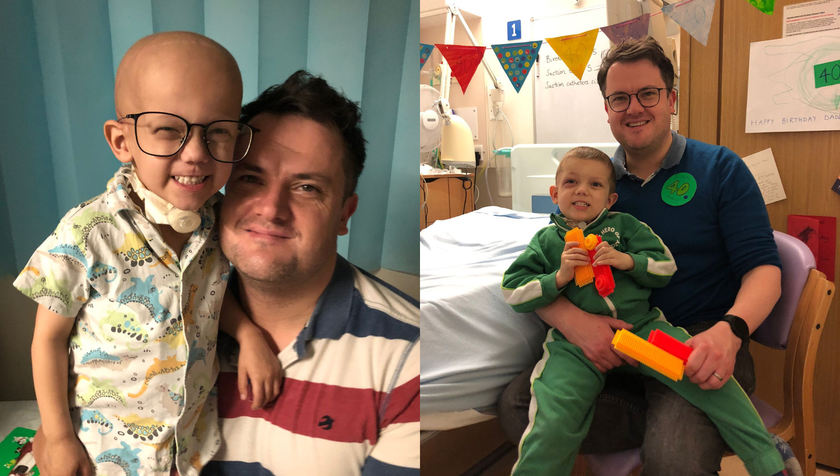
Post treatment, we were amazingly supported by East Anglia Children's Hospice (opens in a new tab), another incredible charity. George passed away there.
A message that I've always really wanted to get out to parents is that a hospice isn't just end of life care. When we made the referral for George, it was because he had a tracheostomy. It was incredibly hard, this articulate little boy suddenly not being able to speak.
When the referral came, I was like “Why is my son going to a hospice? He's not dying, not yet anyway.” But it became apparent when we visited, how magical a place it was.
If you're a parent whose child has medical needs, for any awful disease they’re receiving treatment for, get in touch with a hospice. They give a space for you to relax, have a cup of tea, maybe they'll make you a hot meal.
For George, it was a replacement for nursery. He missed nursery so much. He loved going to nursery, seeing other children, learning, and the hospice gave us that space.
Mental health support
Talking to friends and family, talking to professionals, maybe just the odd conversation with a stranger, can really make a difference.
There’s a therapist I see once every five weeks. She observed that I might be slipping into a bit of depression. She explained the difference between grief and depression and what that can sometimes lead to. Recently, I visited my doctor to talk about mental health and the space and the advice he gave me was incredible. He made a couple of little suggestions for keystone habit changes, and they've been amazing.
As daunting as it might feel about going to a doctor or speaking to a healthcare professional about mental health, or how you're feeling at that moment, do it - it's incredibly helpful.
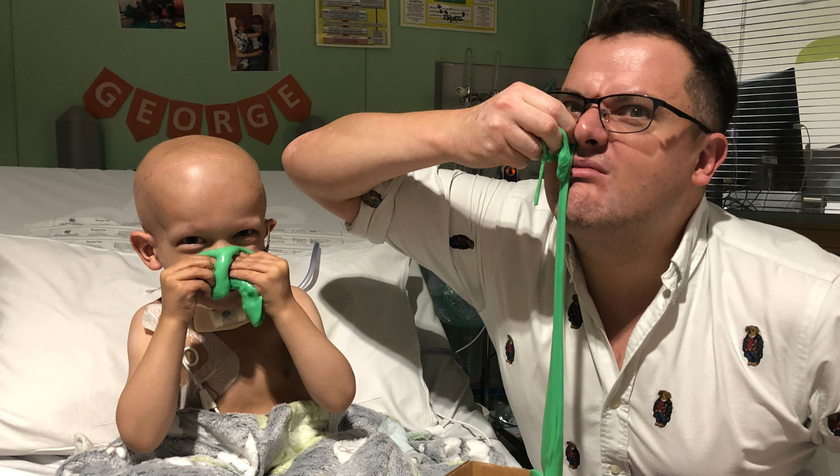
Thinking about Cambridge Children’s Hospital
When George was receiving treatment at Great Ormond Street, they offered Lisa and me a therapist each. It was such an amazing platform where I was able to talk about my concerns, worries, just anything. I genuinely think therapy allowed me to be a better father to my son. All George wanted was to be the wonderful boy that he was. He didn't ask for the cancer, but he had it. And the boy that he was at that point was an amazing little boy with cancer.
At Cambridge Children's Hospital, if they're able to offer parents one-to-one therapy whilst their child is in hospital and receiving treatment, that would be incredible. Also, it would be great to have some really good play areas. Make sure the play equipment’s right.
I know the new hospital is going to be an incredibly magical place and I can't wait until it's built. If it gives an area for families to be families whilst they're going through the most horrible experience any parent should have to go through, any child should have to go through, it’ll be something good.
Watch David's full video
David reflects on caring for George in hospital
Link: https://youtu.be/5B8gGONQags
